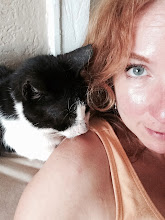Online Immortality and Other Perils of the Digital Age
Mind: blown.
It's a moment for any of us here and there. The experience may not be particularly profound; you just have a "whoa" moment and go on about your business. It isn't usually that important. Perhaps this isn't either.
Tonight we had Thanksgiving dinner and I uploaded a family photo to Facebook.
And so it uploaded, on my 12-year-old Mac, which tends to go into super slo-mo spinning-rainbow-disk mode whenever you ask it to do anything complicated like look at pages with Javascript on them.
Before posting, it automatically tags your photo for your convenience. There's a box around my face, my older daughter's, and my son's girlfriend's. It's correctly identified each of us.
So I had a "whoa" moment here. Facebook can identify me on sight, whether it's a picture I post or a picture a friend posts. I could delete my account, but presumably, it would still know when I crop up here or there.
To me, some of the privacy concerns about social media in general have always seemed a little narcissistic. Really, who cares? In the grand scheme of things, does it matter if you're easily pulled up in an internet search? Why would anybody search for me? Is my life that important? I am living it, and consider myself something of an authority when I say it isn't. But thanks for asking.
The concerns, though, are real. Being a nominally grown-up person, I've been careful on Facebook for a while. I have work contacts - my boss, in fact (whom I worked with in a different capacity, outside my organization, before he became my boss; but I haven't seen any need to unfriend him). I keep political and other potentially controversial opinions more or less to myself, including in public threads such as liked-page post comments, or in comment threads on posts by like-minded friends. I know they show up in people's feeds, whether directly connected to them or not.
In this case, though, Facebook recognized my older daughter and my son's girlfriend right away. It prompted me to tag my son and younger daughter, whom it didn't recognize. It didn't even ask about the cat. The cat is Bingo, Facebook. Bingo is important. This is the internet, Facebook. Perhaps you've heard of cats?
It just got me thinking about how it doesn't matter if I am on Facebook or not. Facebook was just the beginning of something so much bigger. Society, as of course we've known for a while, is not and never what it used to be. Things change, always, and now, everything we do is public. Many things we do are published. And, to some extent, maybe a large or at least increasing extent, we've lost control of whether we are publishing or not. We are all part of a much larger network, on- and offline, and enough members of that network are publishing that we are out there. All of us.
I'm not particularly paranoid. I don't bitch about Facebook's privacy settings. I know to turn off notifications for certain audiences. It's a fact of life; facts of life change; you adapt. Everybody has to adapt, because life changes. Nothing new here.
What I'm actually excited about - with supreme narcissism, as it turns out - is that every time a new iPhone comes out, I start thinking maybe I don't actually have to die. Because, you know, now you don't even have to touch the thing, in case your fingers happen to be all greasy from eating fried chicken. And if your arteries are fatally clogged (just a coincidence, I'm sure!) and you suffer cardiac arrest, I'm thinking that we are only a couple of releases away from an iPhone that uploads your memories, behavior patterns, and knowledge, and is able to function enough like you that it is and may as well be a reasonably perfect copy. So your body gets old and dies, so what? You're completely backed up, and if you've been careful, your screen isn't even cracked.
I don't know about you, but I have always felt that dying is overrated.
What happens when the internet consists largely of living, conscious human minds? What happens when flesh-based people become a minority? We electronic people would have a much larger base of knowledge and experience, not to mention the ability not to get distracted by such unnecessary physical demands as craving trans fats or sex with wildly inappropriate partners. Wouldn't it make sense for us to run things for the common good? Wouldn't these flesh children be considered incompetent to make any serious decisions? They'd have to be ruled and protected, and/or used for whatever they might still be good for that electronic people couldn't do. (The first few generations of electronic people probably would lack qualities like the occasional spark of spontaneous genius, but I bet those advances would come pretty quickly.)
So anyway, facial recognition software = dystopian electronic society, but at least we should still have plenty of cats. Where there are cats, there is hope.


0 Comments:
Post a Comment
<< Home